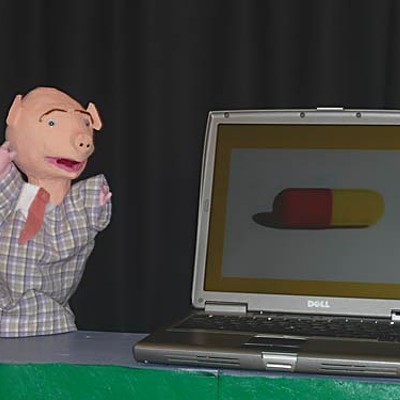Dr. Ring's Single-Payer Puppet Show
Fighting for universal health care, one performance at a time
By Hank Sims[
{
"name": "Top Stories Video Pair",
"insertPoint": "7",
"component": "17087298",
"parentWrapperClass": "fdn-ads-inline-content-block",
"requiredCountToDisplay": "1"
}
]
It's a pretty Sunday morning inside a prototypical Humboldt County home -- big windows, open floor plan, cluttered interior, deck, view of the woods -- and slowly but surely people are filing in, each of them various degrees of late to the 11 a.m. run-through. There's a few nurses, a social worker and at least one layperson. Many carry baked goods.
Dr. Wendy Ring greets a few of them briefly as they arrive, but she and her husband, Michael Shapiro, are too busy for extended pleasantries. They run this way and that, gathering materials and readying the homemade puppetry proscenium that now takes up a large section of their living room. Shapiro, a supporting member of the production, takes a moment to show off his design of the stage, which allows for easy portability -- a must, given the number of shows the group hopes to stage in the coming months.
Ring, though, barely stops moving. Even while she talks, she is doing something else -- handing out scripts, reviewing staging directions, moving the troops around her home like the world's politest four-star general. One gets the impression definite impression that this her normal state; that she is rarely, if ever, at rest. Short, slight, 51 years of age, with wavy hair cropped back short and dressed in Humboldt casual jeans and sneakers, she is in her day job the medical director of the Mobile Medical Office, a traveling clinic that cares for extremely poor people from Arcata to Rio Dell. She founded the program nearly 20 years ago, and has been recognized by the California and national medical associations, as well as the state legislature and the U.S. House of Representatives and the Senate, for her groundbreaking and tireless work.
A few months ago, a group of Humboldt County citizens started meeting regularly, planning strategy. Most members of the group were physicians or other medical professionals. The nation had just undergone a dramatic change of regime. It wasn't just that a new president had been elected; the policies and philosophies of the Republic party had been sweepingly rejected. The financial system had tanked, plunging the nation into deep recession. The new president's campaign slogan consisted of one word -- "change" -- and whatever the slogan might have meant to individual voters, the electorate as a whole yearned for it. And the president-elect and the public agreed on one point: Few things needed changing as much as America's catastrophic health care system.
The group meeting in Humboldt County assigned themselves a task: How could they, in their small corner of the country, join the upcoming battle over health care reform on the side of what they considered the most sensible alternative -- a universal, government-run system of health insurance of the type that exists in every other developed nation on Earth? How could they, individual doctors and nurses and everyday citizens, counter the massive advertising and lobbying budgets of the health insurance companies, which would have the most to lose under a government-run, or "single-payer," system of health insurance? Originally, the idea was that they would sponsor a teach-in of some sort -- a day of speakers, lectures and discussions of policy alternatives.
"That's what I was sort of assigned to organize," Ring says now, fussing with one of her puppets while she speaks. "And I said, 'Nah, I'm going to make a show.'"
One actor is still absent without leave at half past noon, but Ring makes the executive decision to start the rehearsal. Half a dozen people crowd behind the stage, scripts and puppets in hand. Action is called. And since the CD a musically inclined volunteer has promised to make is not yet ready, a chorus of warbly voices starts in, a cappella, on the opening number.
"The hiiiills are aliiiive ... with the sooouund of ... moolah."
^^^^^^
A few days later, Ring and her colleague at the Mobile Medical Office, Dr. Mary Meengs, are among the first speakers to address a day-long class for caregivers, social workers and policy-makers that has been organized by St. Joseph Hospital. It's called "A Workshop to Promote Healthier Communities: Poverty and Homelessness," and over a hundred people are in attendance in the big room at the Arcata Community Center.
Mobile Medical was invited to give some perspective on treating people who have often have a whole raft of problems, lack of money being only the most obvious. When Ring's turn at the podium comes, she tells of a patient she has been seeing for 19 years, ever since she first opened Mobile Medical. He turned out to have high blood pressure and a chronic kidney disease, but at first he wasn't interested in addressing those issues.
"The first time he came in, he wanted me to take the microchip out of his head that the CIA planted there," she says. She explains that she eased him past that demand and eventually got him to agree to agree to a treatment for his blood pressure. After a year, he was ready for antipsychotic medication. He has underwent treatment for his kidney problems. And now he has lived to hold his grandchildren, she says, whereas if things had gone just a little bit differently that first day she is certain he would have been for a decade or more.
The lesson, she says, is that you never can tell which of your patients will be able to turn things around. You have to give them all everything you have. And among her clientele, you have to make a solemn promise: "I will be your doctor." The five magic words, she calls it.
The promise isn't given lightly, and it incurs immense responsibility on the part of the physician. After the conference, Ring will travel to Fortuna for her Mobile Medical appointments there, which will keep her working into the night.
According to a survey last year from Humboldt State's California Center for Rural Policy, 25 percent of Humboldt County residents aged between 18 and 64 years of age lacked any sort of health insurance. As one would expect, people living beneath the poverty level were far more likely to be uninsured; nearly 40 percent of impoverished Humboldt County people had no insurance. Many of those people -- and especially the most downtrodden, including the homeless -- end up at the Mobile Medical Office when they get sick.
A single-payer national health program of the type that Ring advocates -- and which a clear majority of medical professionals (and Americans generally) support -- would naturally be of most benefit to those people, to such a degree that Ring is a bit concerned that programs like the Mobile Medical Office would be deemed irrelevant. Under a national health program, all health insurance would function more or less like Medicare. There would be a single, government-run office that would reimburse doctors and hospitals for service. The system would be funded by taxpayers. Every citizen would be covered, the way they are in Canada and all Western European countries.
But single payer isn't just the most socially just health care reform option, according to Ring; it's also the only system likely to remove the vast inefficiency in the American medical industry. It's a necessary precondition for an real reform.
"Right now, with all these different programs, you don't have the ability to make a systematic change," Ring says.
At the most obvious level, under single payer there would be no private, for-profit intermediary between health care providers and patients, and therefore no need to suck excess profits out of that exchange. But there are less obvious problems that single-payer insurance would solve as well, according to Ring. For one, medical professionals would not have to expend the energy and cost they currently do in negotiating with several different insurance companies and understanding each of their procedures for reimbursement. More importantly, a national health care system would have more incentive to focus more of its efforts on disease prevention, which is generally a far less costly alternative than treatment. As it currently stands, the insurance companies benefit by pushing treatment off into the far future, when it becomes Medicare's problem.
^^^^
When Ring rejected the idea of organizing a teach-in, she did so out of concern that only people already converted to the cause would show up. It would do little to help her patients, or people on the fence, to dissemble the public relations campaign she believes that insurance companies will soon launch in the battle over reform.
"There's always a danger in Humboldt of preaching to the choir," Ring says. "And we don't want to preach to the choir."
She ended up writing a play, and ended up staging the play for puppets. Her script, The Sound of Moolah, is a series of facts, statistics and political argument laced together with witty, farcical agitprop. As the title suggests, it is a retelling of The Sound of Music. A pun-happy cow narrates. The Nazi villains in the original are transformed into scheming drug and insurance company executives.
Shrewdly, though, the fanged and porcine CEOs are not the piece's direct target. Instead, it aims at the so-called "Massachusetts model" of health care reform, which appears to be the Obama administration's preferred alternative. The model, based on a reform program enacted by that state in 2006, mandates citizens to purchase private health care insurance. It offers financial assistance to those who cannot afford it, and enacts penalties against those who do not enroll in a plan. Private insurance companies are still in the driver's seat, and physicians must still deal with the tangle of paperwork that arises from the multiplicity of competing plans.
In Ring's play, Maria is a young doctor booted out of her job by an HMO administrator on the grounds that she is not cost-effective -- she orders too many tests for her patients, and cares for them too well. She sees an ad seeking a doctor for a rural clinic in Massachusetts. Having heard of the health care reform in that state, she eagerly sets out. Once installed she meets up with the "Von Trapped" family, a struggling single father with a set of conjoined quintuplets, each of which has a different medical condition. There's a chronically stoned hippie, a crusading investigative reporter, and various buffoons and lackeys and dopes. Through her new neighbors, Maria comes to realize that the Massachusetts model is not the pretty picture of reform it seems. She and the Von Trappeds attempt to escape over the hills into Canada.
The bigwig executives embrace the Massachusetts model as their last, best hope, and nearly convince a pliant Barack Obama to accept their style of reform. Obama wistfully wishes for a movement to come along and push for national health, but goes along with the executives' decision to bar advocates of a single payer system from his policy summit on health care reform. (This is an echo of Obama's actual policy summit, which occurred in late February.) All appears lost. But ...
The Sunday run-through, with the theatrically untrained health care professionals and activists manipulating and voicing the parts, was undeniably shaky. Between acts, there was much debate about whose hands should go where, and how the props might be manipulated without them falling off the stage. But the play has already developed a life of its own. Advocacy groups similar to the one in Humboldt County have formed throughout the nation, and two such groups, ones based in Albuquerque and San Francisco, have asked for copies of the script.
"For me, making the puppets was really, really fun," Ring says, sitting for a moment in the sun outside the Arcata Community Center after her presentation. "It stopped being fun around the last two puppets, but I just kept going."
She and her troupe have a lot of work ahead of them. The next fun thing, presumably, will be seeing the results.
The Sound of Moolah is currently scheduled to show at 8 p.m. on Saturday, April 25, at 8 p.m. in the Labor Temple (840 E St., Eureka) and at 6 p.m. on Sunday, May 17, at the Westhaven Center for the Arts (501 S. Westhaven Dr., Westhaven). Additional dates and locations are planned throughout the summer.
Comments (2)
Showing 1-2 of 2
more from the author
-
Cache Flow Problems
Malfunction at cable Internet provider leads to stale Web pages, private information exposed
- Feb 3, 2011
-
Hot Seats
As the general plan update finish line looms nearer, upheaval over planning commission membership
- Jan 27, 2011
-
Is Everybody HAPPY?
- Jan 20, 2011
- More »
Latest in News
Readers also liked…
-
Through Mark Larson's Lens
A local photographer's favorite images of 2022 in Humboldt
- Jan 5, 2023
-
'To Celebrate Our Sovereignty'
Yurok Tribe to host gathering honoring 'ultimate river warrior' on the anniversary of the U.S. Supreme Court ruling that changed everything
- Jun 8, 2023







































